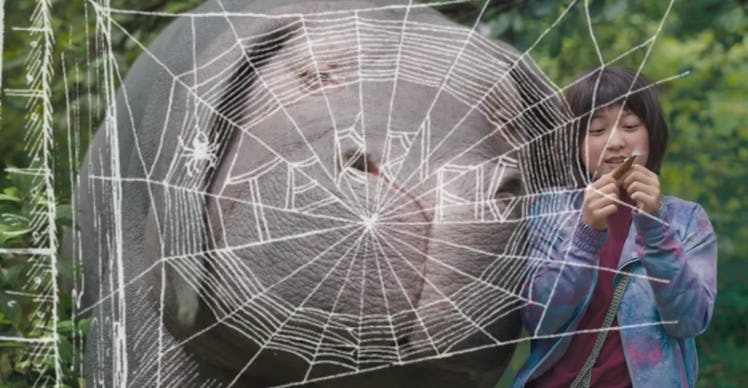Okja is a Gritty ‘Charlotte’s Web’ Reboot
Some elephant-sized pig!

Okja, the new Netflix film by Bong Joon-Ho is a big deal for the streaming service because it’s a very good movie, a quasi-auteurish tale told with supreme confidence by a director known for making high concept films about who (or what) eats whom. Like Snowpiercer, Okja, which follows a girl and her elephant-sized, genetically altered pig on a death-defying journey, is both science fictional and extraordinarily grounded. It is also a pretty close update of E.B. White’s swine/child buddy tragedy Charlotte’s Webb. There are scale differences to be sure–Okja is big enough for a thousand Christmas dinners–but the similarities to the 1952 children’s classic can’t be coincidental and the lessons are ultimately the same.
Here’s a recap of White’s classic novel for those unfortunate enough not to have reread it recently (book and movie spoilers follow): Fern, a young girl, rescues a runt piglet from slaughter and names him Wilbur. The pig is raised on her Uncle’s farm, but with the minor caveat that he’s to be eaten on Christmas. That changes when Charlotte, a spider with a heart of gold, and the rest of the barn animals pull together to convince the farmer to spare the pig’s life. Charlotte spins webs praising Wilbur (“Some Pig”, “Radiant”, “Humble”) and the farmer spares the pig’s life after garnering minor local fame at the Blue Hill Fair in Maine.
Although the most memorable characters in Charlotte’s Web are Wilbur and Charlotte–they’re animals that talk, it works–the book is largely about Fern, who lives down the road and doesn’t seem to have a particularly special relationship with animals generally. Fern likes Wilbur, who she pushes around in a baby carriage, because she likes Wilbur. The tautological affections of children are a theme of the book, which isn’t about animal cruelty so much as it is about the arbitrary, beautiful kindness of children–and also fame.
Okja is slightly more strident than Charlotte’s Web, but, like the book, it’s much more concerned with relationships than with inter-species politics. Bong Joon-Ho borrows from the White playbook and offers up humans that just feel like so many more animals. (No, not Tilda Swinton’s Lucy Mirando. Swinton slays.)
The film starts in the spider web. Mirando is hosting a press event to celebrate the creation of a “non-GMO” super pig by her company, which bears striking resemblance to Monsanto. She says that the pig is a miracle discovery from Chile that will feed the world (this is a lie). Its babies will be sent to farmers around the world to help people grow the biggest super pigs. The program will run for ten years and there will be a Blue Hill Fair-style competition at the end.
A Korean farmer in the program receives a super pig and his niece, Mija, names the pig, Okja. Mija and Okja become best friends over the course of a decade. As it was with Wilbur and Fern, Okja and Mija simply dig each other. They are sympatico–so much so that they play together, cuddle, and save each others’ live. Okja, Joon-Ho makes very clear, is some pig.
Then the contest comes and the barbarians start shaking the gates. Mija winds up receiving help on a rescue mission from the Animals Liberation Front. ALF’s sole purpose is to liberate animals, and expose Mirando the human and the corporation as murderous frauds. They have, in the manner of PETA, videos of super pig abuse. Their plan to rescue the larger protagonist crescendos in the film’s final act, which, like Charlotte’s Web, takes place during a ribbon ceremony for “Best Pig.”
The narrative device leveraged in Okja story that most definitely shows how beholden the film is to Charlotte’s Web concerns communication. Adults don’t understand animals. Though Okja doesn’t really talk (though maybe he does?), it seems that Mija and Fern do and both are clearly understood to perfection. Why does this matter? Because it creates a discrete rhetorical space for kids and animals in which adults are interlopers and invaders. It suggests that not only maturity, but specifically the knowing consumption of meat represents a fall from grace. Think of it as reverse catholicism.
Still, the big takeaway from both Charlotte’s Web and Okja is that children are beautiful hypocrites. Mija is not an animal rights activist. She eats fish in the movie without remark. She’s just an activist for one animal’s rights. Fern doesn’t object to the farm or, it seems, to bacon. She loves Wilbur. The strangeness of those relationships is what makes them beautiful. They do not make sense to non-children. They can be lionize or praised by adults, but they are ultimately inaccessible. In both stories, the audience accesses affection for an animal through the affection of a child. Both give, in moments, access to that warm mammalian cuddle party held between birth and puberty. Both are about humble pigs who are ultimately honored.
There’s plenty to take away from Okja, which stands well on its own, but perhaps the most salient lesson is this: Charlotte’s Web is really good. This is true. Charlotte’s Web is some pig too.
This article was originally published on